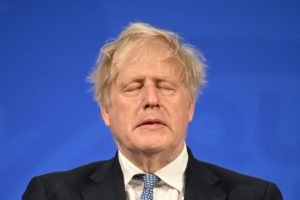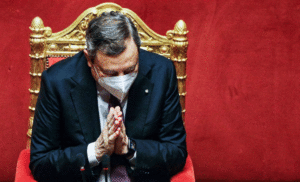If you want to feel a certain sense of dread, look around you, at the accumulating challenges facing Western societies, and at the leaders chosen to manage them. The archetypal, boringly competent, technocratic politician of the past 40 years stands naked, revealed as unfit to deal with the problems of our time. The clever liberal voices don’t seem that clever anymore. Their words feel emptier, and their recipes have only increased social disintegration, institutional degradation, and economic polarisation.
These days, it’s commonplace to see garlanded technocrats such as Mario Draghi leaving office in shame. The decay of liberal elites has been the central political narrative of the last decade across the West. Surely, then, the time is ripe for a populist upsurge?
And yet, while a handful of insurgent leaders and parties have reached top office promising to shake up the liberal establishment, the first wave of populist and anti-establishment governments of the 21st century has so far shown itself utterly incapable of replacing liberal elites. Tragically or otherwise, the recent ousting of Boris Johnson is the perfect example. Thanks to Brexit, Johnson had the strongest mandate of any British leader in the last half a century. To the disappointment of many, however, the incompetence of his cabinet reproduced the same vices of the elites he aimed to supplant — elites to which, it must be said, he always himself belonged.
But for all its charming British idiosyncrasies, Johnson’s rise and ignominious fall is not a drama specific to the UK but a defining feature of the first populist wave. Under this label, we can classify a diverse range of anti-establishment forces and leaders which rose to power in the period from 2014 to 2022, whether Donald Trump, Syriza, or the coalition government between the Movimento 5 Stelle and La Lega. These movements all represented different ideas and varying degrees of claimed distance from liberal power brokers, but they all campaigned under the slogan of taking power from the elites and giving it back to the people, promises they all singularly failed to achieve.
The promise and virtue of anti-establishment forces lay in their capacity to build their strength by gathering support from aggrieved sectors of the working and middle classes who felt the system was failing them. They introduced topics to the public agenda that were excluded from political debate. The new communication techniques introduced by populists disrupted traditional political parties. This ensured populist coalitions were successful election-winning machines, but governing effectively was an entirely different story. Perhaps one of the most significant traits populist governments share is that absolutely none of them actually fulfilled their pledge of rebuilding their nations anew.
The constraints of real-life governance will always water down any promise of revolutionary change. Nevertheless, the problem with that recent wave of anti-establishment governments is not that the reforms they implemented fell short, but that such reforms never even began. The first thing Trump did was to suspend the TPP and the TTIP agreements, but then his government failed to present a programme to re-industrialise America. Boris Johnson eventually got Brexit done, but his real merit was preventing Brexit from being actively undone by technocratic liberal activists. Leftist Syriza passionately campaigned against EU austerity measures but, in the end, surrendered before a humiliating memorandum imposed by the Troika. Overall, almost no remarkable policy change was delivered by any of the numerous anti-establishment governments that took office during the past 10 years.
This is because these new forces were always weaker than hysterical liberal pundits wanted us to believe. To begin with, populist platforms have often been unwieldy coalitions of the disenchanted, united around a charismatic leader and common contempt for liberal elites. Their leaders have often been excellent communicators — especially compared with the boring centrist grey men — but they rarely had deep ideas of their own. If populist governments did not deliver meaningful change, that is partly because they didn’t know what exactly they wanted to do once in power. Political opportunism may get you into office, but it can’t reform a country.
Without a clear set of ideas, populists had a hard time framing social events in ways that could break with traditional political allegiances. And once in power, sooner or later, they all withdrew to their original ideological safe space. When BLM protests erupted around the country, Trump took a traditional Republican stand, invoking “law and order”, though until then, a central part of his discourse relied on a strong mistrust of the deep state and the security apparatus. On the Left, we have seen how Bernie Sanders, Jean-Luc Mélenchon and Podemos sided once and again with the liberal centre to “Stop Fascism”. For a brief moment, it seemed possible that Boris Johnson would unleash the sovereign power of the British state towards reindustrialisation and finally lead the Tories from under Thatcher’s shadow.
Despite their use of disruptive communication and reliance on mobilised grassroots, the platforms that enthroned populist leaders were ultimately all too similar to the traditional electoral machines they aimed to confront. In the case of Johnson or Trump, they used conventional parties with almost no internal reform. Regardless of the lack of clear vision at the top, populist platforms lacked a competent, reliable line of middle-ranking officials able to translate the orders of the command staff to the tailored demands of everyday politics. History teaches us that reliable bureaucracies are the backbone of good governance. Every visionary start-up leader needs a bunch of boring Excel drones, but the boring work of government was never quite to the populist, crowd-pleasing taste of Johnson, Trump, or Salvini.
So, during their time in office, they often combined chaos and poor governance with the tendency to delegate their day-to-day responsibilities to individuals linked to the old political elites — their purported opponents. The introduction of technocratic figures with no interest in implementing the changes populists promised sucked out all transformative energy those governments might have possessed. They were like the barbarian Mongols or Manchus who conquered the Chinese empire: after some initial disruption of the system, they surrendered their hard-won power to the old mandarins. Of course, the difference is that the successful barbarian king could lop the heads of bureaucrats if they found them obstructing the advance of the new order; today, the old establishment successfully used the incompetence of populist governments to take them down. The crown changed heads, but sovereign power never changed hands.
Trapped by the system’s institutional inertia, anti-establishment governments focused on what they did best, attacking the establishment, but not on remedying its errors. Criticising the elites is both a necessary task and an enormously satisfying one. But voters who gave their confidence to anti-establishment leaders expected something more than just seeing liberal elites being owned on Twitter. They expected reformers that would govern well on their behalf, changing the functions of the state in their image. While liberals caricature populist supporters as ignorant bigots, what actually feeds anti-establishment sentiment has always been the search for a point of anchorage in a time of turmoil and the hope of good governance. And no matter how whiny and annoying they can be, elites can still, it turns out, perform far better than common citizens in the task of governance.
The endurance of liberal regimes always lay in their capacity to inoffensively integrate external pressures and to prevent any attempt to implement structural change. That’s because, as with any other successful social system, liberal regimes are sustained not only by their front-line political backers but also by an entrenched network of interests and social organisations operating outside the formal structures of governance. That network acts as a para-state, with power inside and outside the state neutralising any possible threat. That is where social elites play their essential role in sustaining even a failing system’s capacity for survival.
Any political movement aiming to deliver reforms and break with the constraints of decaying liberal systems will therefore require something more than just winning elections and producing viral memes. After gaining office, the executive action of the government will need to be supported by an external solid social coalition. This means that an alternative network of civil society organisations must have already been built, incorporating unions, intellectuals, businesses, communities, churches. This will equip the new elites with the tools to finally reform broken Western societies, while also safely accommodating elements of the old establishment without keeping them in the driver’s seat.
But in the meantime, the discontent that populist movements represented isn’t going away. In this state of permanent crisis, we will keep witnessing continuous social eruptions with strong anti-elitist sentiments: just wait for this winter when European voters leave their freezing homes to warm up the streets. Some of the new anti-establishment forces will try to recycle the old, failed populist form. Turbocharged with fiery rhetoric but incompetent at dealing with the most trivial tasks of governance, they will likely meet the same end.
Others, however, will learn the lessons of the previous populist wave and go beyond the outdated formula. This has been the historical pattern of past anti-establishment movements, from Chartism to Socialism; from the völkisch movement to the German Conservative Revolution; from the Russian revolution of 1905 to 1917; from the dispersed groups of American populism and the victims of the Great Depression to the coalition that brought the New Deal. In all of these, we can see the historical tendency to evolve from disorganised eruptions to disciplined structures, maturing from a general intuition about what is not working in our society to nuanced theories and complex doctrines, from the enfant terrible to visionary leaders and effective organisers.
Any well-functioning society still needs elites, no matter how bad they are. Populist revolts have removed the veil of liberal decadence, and our political systems have reached a point of no return. But inchoate populist rage is not enough. Whoever aspires to bring real change to Western nations must first work to build an elite class fit for the hard task of governance. As Boris learned, any fool can win power: the hard task is to wield it.
Disclaimer
Some of the posts we share are controversial and we do not necessarily agree with them in the whole extend. Sometimes we agree with the content or part of it but we do not agree with the narration or language. Nevertheless we find them somehow interesting, valuable and/or informative or we share them, because we strongly believe in freedom of speech, free press and journalism. We strongly encourage you to have a critical approach to all the content, do your own research and analysis to build your own opinion.
We would be glad to have your feedback.
Source: UnHerd Read the original article here: https://unherd.com/




